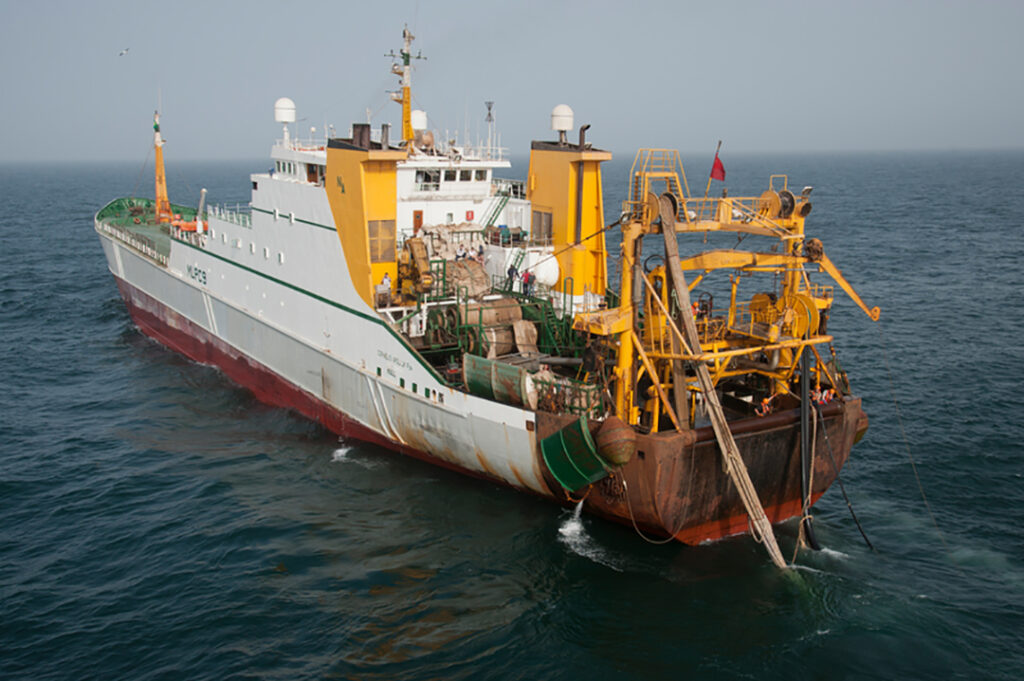ADF STAFF
The industrial fishing trawler Lu Rong Yuan Yu 956 was detained in Ghana in 2019 for using nets with a mesh size below the legal minimum and catching undersized fish. The vessel’s owner was fined more than $1 million but refused to pay.
As the case returned to court, the vessel’s fishing license was renewed, and it was back in the waters of Ghana and Côte d’Ivoire. As the Environmental Justice Foundation (EJF) reported, officials apprehended the trawler again on the same charges in Ghana in May 2020.
The Lu Rong Yuan Yu 956 saga highlights the ways shell companies and joint venture agreements make it difficult to investigate and prosecute trawlers accused of illegal, unreported and unregulated (IUU) fishing.
Shell companies are created to hold funds and manage another company’s or individual’s financial transactions. They look like a real company but exist only on paper. A joint venture agreement is an arrangement between two or more companies to start a new company for their mutual benefit.
Although Ghanaian law prohibits foreign investment in joint ventures in the industrial fishing sector, many trawlers in Ghana appear to be owned by foreign front companies created to obtain Ghanaian fishing licenses, according to Trygg Mat Tracking, a nonprofit research organization specializing in IUU fishing and maritime crimes.
The Lu Rong Yuan Yu 956 is Ghanaian-flagged, and records show it is owned by Gyinam Fisheries & Sons Ltd., a Ghana-incorporated company controlled by Ghanaians. But Trygg Mat Tracking found through Chinese government sources that the trawler actually is owned by the Chinese fishing company Rongcheng Ocean Fisheries Co. Ltd.
In Ghana, only a front company’s name appears on vessel license lists and a database maintained by IHS Sea-web, but the EJF has reported that 90% to 95% of Ghana’s trawler fleet may have Chinese involvement.
There are no legitimate benefits to African nations to let fishing vessels owned by shell companies operate, Duncan Copeland, executive director of Trygg Mat Tracking, told ADF in an email.
“Joint ventures are highly complex, and while the intention can be to have local benefits, too often these company structures are exploited to the profit of the foreign owners,” Copeland said.
Namibia has encouraged joint venture arrangements, but a 2019 whistleblower complaint uncovered allegations of corruption among top Namibian officials over improper distribution of fishing rights and quotas to foreign interests and joint venture companies, Trygg Mat Tracking reported.
The complaint was anchored by documents leaked by a former employee of the Icelandic fishing company Samherj. Although Samherj appeared to hold a minority ownership in its Namibian subsidiary, Katla, it actually maintained majority control of the company through payments to Katla’s majority Namibian shareholder, the documents showed.
Namibia’s minister of fisheries and minister of justice resigned over the complaint, now known as the “Fishrot” scandal, and authorities are still investigating.
Transparency Needed
Steve Trent, executive director of the EJF, said countries should have systems in place to identify a vessel’s beneficial ownership and ensure that owners can be held accountable for illegal fishing or other maritime crimes.
“This includes requiring disclosure of ownership arrangements when a vessel is registered to a country’s flag, or applies for a license or authorization to fish,” Trent told ADF in an email. “There should be clear information identifying the entity that ultimately profits from or controls the vessel’s activities that is made available to the public and updated when needed.”
Transparency measures, such as requiring unique numbers for fishing vessels, also can help countries trace a vessel’s history and ownership and detect the use of shell companies. To identify illegal and unsustainable fishing vessels, Trent recommended that countries use Global Fishing Watch to publish fishing vessels’ activities in real time and make the information available — a simple, cost-effective measure.
“Failing to report or providing false information on ownership should result in deterrent sanctions,” Trent said. “Where a vessel is identified or suspected of being operated through a shell company, the vessel should be refused registration and a license or authorization.”
Trent called for strict law enforcement in countries such as Senegal, where marine vessels must be at least 51% owned by nationals or companies that either are Senegalese or a member of the Economic Community of West African States.
“Where foreign entities are suspected of establishing front or shell companies to circumvent local laws, as is the case in Senegal, fisheries authorities can engage agencies with an investigative mandate to look behind corporate structures and at the destination of financial flows to establish the true beneficial owners of fishing vessels operating under their flag or in their waters,” Trent said.

